Sheffield Doc/Fest Part 2: SHUT UP SONA, THE GO-GO’S, BITTER BREAD

Musanna Ahmed is a freelance film critic writing for Film…
Part 2 of my coverage of 2020 Sheffield Doc/Fest’s online program features reviews of Shut Up Sona, The Go-Go’s, and Bitter Bread.
Shut Up Sona (Deepti Gupta)
Indian singer Sona Mohapatra is no stranger to controversy and certainly no opponent to freedom of speech, using her platform to call out poor practises within the music industry, from financial exploitation to sexual misconduct to a severe lack of placements for solo women artists at music festivals. Journalists keep her phone ringing, her inbox at its limit, and her team works overtime to ensure her public image remains unscathed.
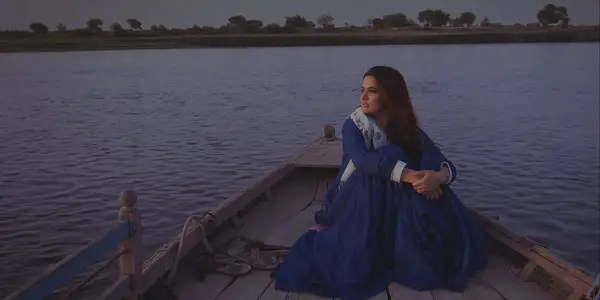
Shut Up Sona opens with a scene of the pop/folk/Bollywood/rock-hybrid singer preparing for a show in the make-up chair before one of her team members rushes to her and tells her that there are five publications at the door asking for 5-10 minutes of interview time. She bluntly tells him: they only care about printing something based on the small window of their meeting, they don’t care about sticking around to watch the show and see what she really has to express. “But what if they print something negative?” he asks. She insists she doesn’t care.
The great Frederick Douglass once said that if there is no struggle, there is no progress, and in Sona’s cause of battling the patriarchy in her industry and country at large, she gets her share of death threats, misogyny, legal notices, and plain old trolling, without ever losing focus of her end goal. Of course, the majority of this drama occurs online, so director Deepti Gupta employs a graphical flair that dynamises the depiction of email and social media that encompasses so much of a musician’s work and public image.
Generally speaking, Gupta directs her film amazingly well and her intimate access into Sona’s life is birthed from years of friendship with the musician. Her self-shooting style allows her to find the great psychic moments that occur when Sona is alone or just with her husband, whilst her protagonist always respects the fly-on-the-wall approach. The overall film is crisply edited, however, it could have benefited from more context and detail on the various controversies that engulf Sona, particularly the #MeToo cases she pushes to the forefront and her confrontation with Bollywood superstar Salman Khan. Perhaps the hesitation to dig deeper in some areas comes from mutual respect as friends.

Nevertheless, for as valuable as Sona’s most polarising elements may be, the most fascinating scenes revolve around the educational pursuit of her activism, continuing to learn about the things she represents. The best sequence of the film involves her going to a Sufi shrine and meeting with some male Sufi leaders to discuss the poetry of Amir Khusro, one of Sona’s biggest influences. It’s a very sensitive exchange of context, support, and information as she earns the praise of those male peers for her knowledge and singing ability, despite knowing that women singers such as herself aren’t allowed to perform in such a Sufi setting.
Shut Up Sona feels like the beginning of a great movement for both the music and film industry. As Sona accomplishes one of her headlining goals and India’s festival scene takes baby steps (still, they’re steps) forward towards equality, and Gupta – one of the first female cinematographers in India – turns in an accomplished documentary about the journey, we’re left with the hope that we can look back at this film one day and notice a positive difference.
The Go-Go’s (Alison Ellwood)
Formed by Belinda Carlisle and Jane Wiedlin, The Go-Go’s made waves in the second wave of the punk rock movement in 1978. They were unique – an all-female band who wrote their own music and played their own instruments, with an album that hit no.1 on the Billboard. But these rockstars did what rockstars do. Decades removed from their roaring success, this highly absorbing documentary allows each of the members to reflect upon the roller-coaster ride that was their career.
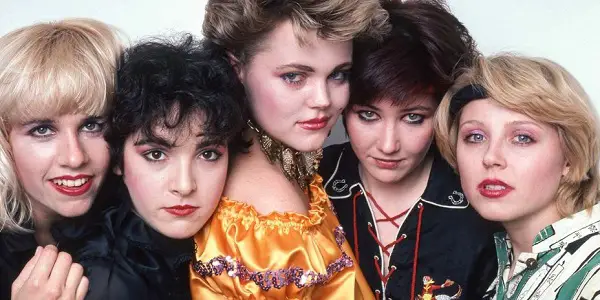
The Go-Go’s is a very absorbing biography that details all the ins and outs of the band’s chemistry, creativity, and recreational drug use. We learn about how Wiedlin and Carlisle came together at the inception to form the band, the departure of their manager, their shift from punk to pop, and how it cost a key band member, the infamous SNL performance, and so much more. If you don’t know the Go-Go’s before watching this, you’ll know them better than you know many of your favourite bands by the end of it.
All five musicians are great interview subjects who could speak all day about their rich artistry and history with rare honesty and self-awareness, and a huge credit to filmmaker Alison Ellwood for her ability to bring out the best in her film’s contributors. There’s a sense that the Go-Go’s have had the time and space to refresh themselves and speak frankly about their lifestyles – guitarist Charlotte Caffey’s drug habits were so out of control that Ozzy Osbourne threw her out of his dressing room – and candid assessments of each of their work, such as Wiedlin’s disdain for their third album Talk Show.
They’re great storytellers who take us back in time to a different era of fandom, a different time in England (where they supported The Police and The Specials), and a different industry for women in music. Aiding their riveting anecdotes are testimonies by members of the aforementioned British bands plus Bikini Kill’s Kathleen Hanna, who offers the welcome perspective of a young fan who was directly inspired to make her own music by witnessing what these women were able to accomplish.
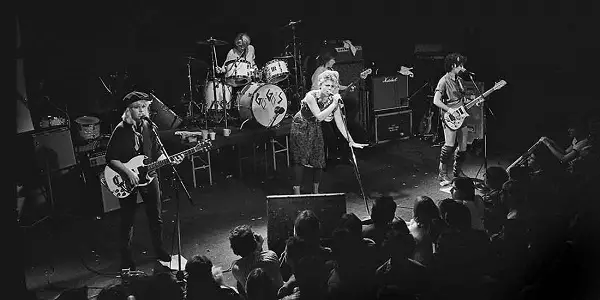
Visually, this film could have afforded to be more creative, beyond the nicely paletted talking heads. I think of how White Riot, which was a parallel story to this one about the Rock Against Racism movement by musicians of the same era, nicely assembled archive images and press clippings to look like an old school, NME-style music zine, or how Kurt Cobain biopic Montage of Heck effectively utilised rotoscope animation to recreate key episodes of a life and career that weren’t captured on a camera.
Of course, perhaps neither of these particular forms of editing would’ve served this story well but for a band with a distinctive visual sense – their rise coincided with MTV – there definitely is something left to be desired. Overall, though, The Go-Go’s is an amazing biopic of a band with a great story, chronicling the great stories of the individuals who made it all happen.
Bitter Bread (Abbas Fahdel)
I’ve seen a fair share of Syrian refugee documentary films and Bitter Bread might be the one that most depressed me. Whilst the brutal war footage in films including City of Ghosts, For Sama, and The White Helmets is overwhelming enough to move anyone to tears, there are no violent images here. It’s simply the stark presentation of refugees living in camps where Bitter Bread wields its gut-punching power.
Obviously, it’s impossible to watch these types of films and not consider how fortunate we all are: I watched this documentary from the comfort of my own home, the conflict in my scenario being that this measure was taken because a film festival needed to go digital this year due to the pandemic. I could spare myself from the bizarre nature of this British summer, whether it be an airborne virus or unpredictable weather, as long as I self-isolated.
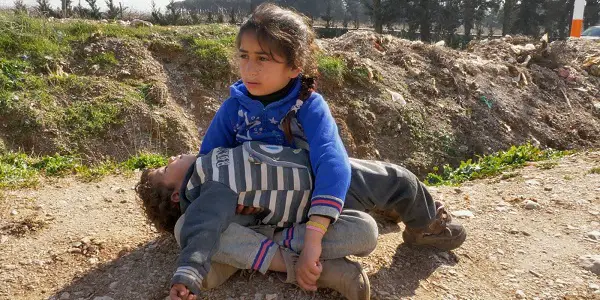
But the kids in Camp No. 3, a small settlement of tents in Lebanon’s Beqaa Valley, have zero choices or autonomy over their lives. “We came to Lebanon to run away from death”, says one of the elders. But when the Lebanese municipalities see Syrians as criminals (as testified by the refugees) and offer them meagre pay for labour in the fields, you have to wonder where the heart is in this world. In Europe, whilst the living standards could be higher, the social norms for treating refugees can get even worse considering the rise of far-right groups (there was a powerful scene in City of Ghosts in which the characters observe a hostile parade) who’ll do anything to prevent migrants coming in. To see this sort of activity in Syria’s own neighbouring country is truly disheartening.
Filmmaker Abbas Fahdel is invited into the private worlds of these refugees and keeps his filmmaking simple, sensitive and embellished, listening to his characters pray for a better Syria so they can leave the misery of the tents, make poignant video calls to relatives living elsewhere, watching the adults work hard and the kids try to make the most, even letting them playfully pose for the camera to bookend the film. An interesting facet is how we only see one Lebanese character in the film whilst the others remain faceless. This individual is Maher Mahmoud, who works as a “shawish”, what we call those in charge of the refugee camps in the Bekaa valley.
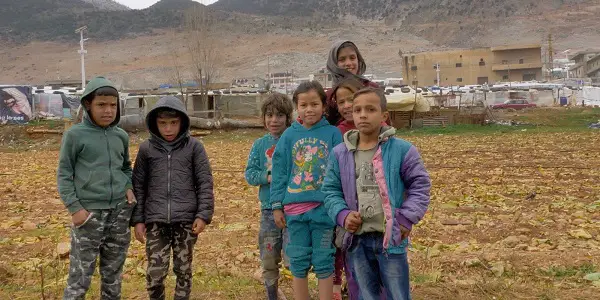
There’s always the question of what a filmmaker is doing in such a zone and the common answer is that they’re shining a light on a community suppressed by the media. Many times, this alone is a great responsibility to assume – to bring a human face to a dehumanised people. However, I hope that, like For Sama, Fahdel‘s film is attached with a campaign that continues to drive relief efforts from international audiences.
It’s quite interesting that some of the stronger documentaries I’ve seen this year, including Acasa My Home, No Kings, and Bitter Bread, revolve around communities who have adopted a primal lifestyle, working with and against nature for food, currency, and social practice. It’s just awful that some of them have no other choice.
Stay tuned for Part 3 of my coverage of Sheffield Doc/Fest 2020 and check out the trailer for The Go-Go‘s below.
Does content like this matter to you?
Become a Member and support film journalism. Unlock access to all of Film Inquiry`s great articles. Join a community of like-minded readers who are passionate about cinema - get access to our private members Network, give back to independent filmmakers, and more.
Musanna Ahmed is a freelance film critic writing for Film Inquiry, The Movie Waffler and The Upcoming. His taste in film knows no boundaries.













